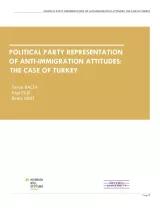Political party representation of anti-immigration attitudes: The case of Turkey
Immigration policy has become Turkey’s most heated topic of debate. While the country has accepted a massive influx of refugees in the last decade, the issue has become more salient in the last two years due to the electorate’s increasing anti-immigrant sentiment.
This rise of anti-immigrant sentiment is related to many factors. Turkey’s current economic crisis has resulted in immigrants’ being made scapegoats and competitors in an increasingly narrowing labor market while their presence is seen as an unnecessary burden on the welfare state. Furthermore, rising anti-government sentiment has encouraged increased criticism of the government’s open-door policy towards refugees. Indeed, the government’s flexible refugee policy may have played a role in the rise of protest voting in Turkey.
No picture regarding immigration would be complete without mentioning the rise of anti-immigrant political parties. In 2021, a political party – ZP (the Victory Party, Zafer Partisi) – was established with an exclusive focus on immigration and became the Turkish version of Europe’s anti-immigrant radical right parties. ZP transformed the negative sentiments within the electorate into a political issue, thereby giving them public visibility. As in EU countries, mainstream political parties have been unable to avoid the transformation of the discussion of the issue and its increasing salience. Thus, almost all political parties in Turkey have proposed political solutions for the immigration issue into their rhetoric and political programs.
One caveat is that almost all the political parties we analyze here, whether through texts or interviews with their representatives, lump the immigration issue into a single large package, without differentiating refugees from irregular migrants or other international groups residing in Turkey for various reasons, such as seasonal work. When talking about migration, their representatives mainly refer to the Syrian refugee issue while putting all migrants into the same basket. Thus, the question of irregular migration usually gets mixed in with the highly regular and institutionalized hosting of Syrians in Turkey. This attitude is more prevalent among the opposition than the governing parties. As the designers and executors of Turkey’s current migration policy, the governing political parties have a clearer vision, including strategic use of migration.
The report comprises five main sections. We first discuss how international migration has been contextualized and discussed in Turkey. Second, we highlight the critical junctures that have transformed the debate around the recent migration of Syrians, followed by a brief discussion explaining data collection and methodology. A more detailed discussion is also provided at the end of the report as an appendix. Third, we present our analysis and findings of temporal changes in anti-immigration rhetoric and Turkish political parties’ anti-immigration scores. This section also characterizes the anti-immigration debate along two dimensions: the salience of the issue and the tone of the rhetoric. Fourth, we discuss how political parties currently frame Syrians living in Turkey and evaluate their proposed migration policies. Finally, we conclude by offering several policy recommendations. It is important to note that our analysis here largely covers the period from 2011 to 2021, thereby setting the background for our follow-up analysis to come before the 2023 elections.
